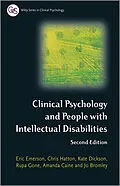Clinical Psychology & People with Intellectual Disabilities provides trainee and qualified clinical psychologists with the most up-to-date information and practical clinical skills for working with people with intellectual disabilities.
* Represents an invaluable training text for those planning to work with people with intellectual disabilities
* Includes coverage of key basic concepts, relevant clinical skills, and the most important areas of clinical practice
* All chapters have been fully updated with the latest evidence. New chapters cover working professionally, working with people with autism and addressing aspects of the wider social context within which people with learning disabilities live.
* Beneficial to related health and social care staff, including psychiatrists, nurses, and social workers
Autorentext
Eric Emerson is Professor of Disability & Health Research at Lancaster University, UK, and Visiting Professor in the Faculty of Health Sciences at the University of Sydney.
Kate Dickson is a Chartered Clinical Psychologist at the Betsi Cadwaladr University Health Board in North Wales.
Rupa Gone is a Chartered Clinical Psychologist at Hertfordshire Community Health Services in Watford.
Chris Hatton is Professor of Psychology, Health and Social Care, Lancaster University, UK.
Jo Bromley is Consultant Clinical Psychologist, Service Lead for the Clinical Psychology Service for Children with Disabilities, Central Manchester Foundation Hospital Trust.
Amanda Caine is Consultant Clinical Psychologist and Professional Lead for Clinical Psychology, Pennine Care NHS Foundation Trust.
Klappentext
Now fully revised and updated, Clinical Psychology & People with Intellectual Disabilities provides both trainee and qualified clinical psychologists with the most up-to-date information and practical clinical skills for working with children and adults with diminished intellectual capabilities. In depth coverage is provided on all aspects of clinical practice - from key basic concepts and assessment to evidence-based intervention techniques. New chapters cover working professionally, working with people with autism and addressing aspects of the wider social context within which people with learning disabilities live. This text also represents an invaluable guide for clinical psychologists in training, who will learn about the current state of our knowledge in this important field, as well as those in related health and social care fields, including psychiatrists, nurses, and social workers.
Clinical Psychology & People with Intellectual Disabilities, Second edition, represents the most comprehensive guide to current evidence-based practices for caring for people with intellectual disabilities in clinical settings.
Zusammenfassung
Clinical Psychology & People with Intellectual Disabilities provides trainee and qualified clinical psychologists with the most up-to-date information and practical clinical skills for working with people with intellectual disabilities.
- Represents an invaluable training text for those planning to work with people with intellectual disabilities
- Includes coverage of key basic concepts, relevant clinical skills, and the most important areas of clinical practice
- All chapters have been fully updated with the latest evidence. New chapters cover working professionally, working with people with autism and addressing aspects of the wider social context within which people with learning disabilities live.
- Beneficial to related health and social care staff, including psychiatrists, nurses, and social workers
Inhalt
About the Editors ix
List of Contributors xi
Preface xiii
Part 1: Setting the Scene 1
Chapter 1 Intellectual Disabilities - Classification, Epidemiology and Causes 3 Chris Hatton
Chapter 2 Service Provision 23 Rupa Gone, Chris Hatton and Amanda Caine
Chapter 3 Social Context 51 Eric Emerson and Rupa Gone
Chapter 4 Cognitive Assessment 63 Isobel Lamb
Chapter 5 Common Legal Issues in Clinical Practice 83 A.J. Holland
Part 2: General Clinical Issues 105
Chapter 6 Interviewing People with Intellectual Disabilities 107 Helen Prosser and Jo Bromley
Chapter 7 Working with People: Direct Interventions 121 Nigel Beail and Andrew Jahoda
Chapter 8 Working with Families 141 Jo Bromley and Christine Mellor
Chapter 9 Working with Organisations or: Why Won't They Follow My Advice? 161 Judith McBrien and Sue Candy
Chapter 10 Reflections on 25 Years Working in the NHS 181 Ian Fleming
Part 3: Working with 203
Chapter 11 Working with People Whose Behaviour Challenges Services 205 Alick Bush
Chapter 12 Working with Offenders or Alleged Offenders with Intellectual Disabilities 235 Glynis H. Murphy and Isabel C.H. Clare
Chapter 13 Sexual Exploitation of People with Intellectual Disabilities 273 Paul Withers and Jennifer Morris
Chapter 14 Working with Parents Who Happen to Have Intellectual Disabilities 293 Sue McGaw
Chapter 15 People with Intellectual Disabilities and Mental Ill-Health 313 D. Dagnan and W.R. Lindsay
Chapter 16 Working with People with Autism 339 Jo Bromley, Elizabeth Crabtree, Christine Mellor and Mary Delaney
Chapter 17 Older Adults with Intellectual Disabilities: Issues in Ageing and Dementia 359 Sunny Kalsy-Lillico, Dawn Adams and Chris Oliver
Index 393
